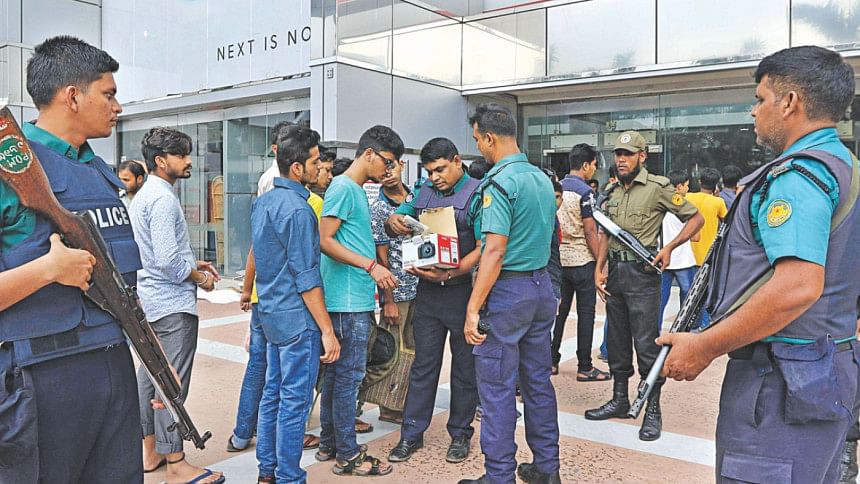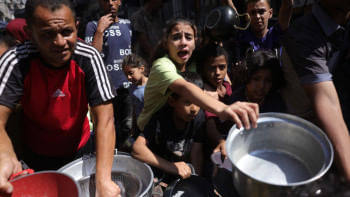Bail blessings for radicals

After the gruesome Gulshan tragedy, photos of 10 missing youths have been put up in the media with families seeking to know their whereabouts.
Junnun Sikder is one such youth.
He was arrested as a suspected militant on August 25, 2013, with eight others. At that time, he told journalists at the Detective Branch office in the capital that to establish a Shariah-based state he believed in the ideology and policy similar to al-Qaeda's. He also said he wanted to participate in an armed jihad and go to Pakistan, Afghanistan and Syria. He would set about fulfilling his wish once he was released from jail.
Junnun along with six others came out on bail in late 2014. Now, all the detective wings of the state are looking for him all over again.
According to the police, prosecution and Dhaka Chief Metropolitan Magistrate's Court, around 500 militant suspects like Junnun got out on bail in the last few years.
Recently, the home minister was asked on a television talk show what the government should do when one-third of the arrested militant suspects got bail and walked out of jail. He answered, “Ask the law minister.”
Faced with the same question from journalists, the law minister on July 10 urged the judges to be more circumspect in granting bail to militant suspects, considering the judiciary's responsibility in maintaining law and order.
The prime minister herself made a similar plea to the judges from the floor of parliament on November 11 last year. She said police arrest these militants after months of hard work and spending a lot of money. It may take six months to a year to arrest one militant. Then, after 15 days, that militant is being set free on bail.
Meanwhile, in the eight months between the appeals of the prime minister and that of the law minister, more than a hundred suspects came out on bail, and they are now alleged to have been involved in militant activities, said a senior police officer.
It all begs the question: Where is the gap between law enforcement and the prosecution process?
Police blame the public prosecutors and the prosecutors blame police. The judges blame both; while hearing bail petitions, they often express annoyance at poor performance of both the investigators and the prosecutors.
Independent analysts say flawed investigation, faulty legal process in filing cases and delayed judicial process are to blame for the failure to keep militants behind bars.
The government, they note, urgently needs to enhance the capacity of the investigators and improve coordination between the police and prosecutors at all stages.
Legal experts say the process of case preparations must be improved. Often judges complain that prosecution presents a case so shoddily and with so many legal loopholes that a judge has no option but to grant bail.
Attorney General Mahbubey Alam on Saturday told The Daily Star the police write case statements in such a manner that the accused do not appear to be militant suspects.
He also said it is the duty and responsibility of the prosecutors to inform the Attorney General's Office when a militant suspect gets bail from any court. But the public prosecutors do not inform his office about suspected militants getting bail from lower courts. It they did, his office could take steps by appealing to the High Court.
He added that sometimes some law officers at the higher court too do not inform him about HC bail to militant suspects. Sometimes, files on militant suspects' bail go missing from offices concerned at the SC. Therefore, his office could not move appeals before the Appellate Division against HC bail orders to militants.
Not much has been done on the home ministry side as well. Three years back, the ministry talked about forming a committee headed by a joint secretary to monitor bail to high profile criminals and militants. That committee was never formed.
Monirul Islam, chief of the police's counter terror unit, said, “We spend so much time and effort in detaining militants. We produce them before courts with sufficient evidence.
“This is entirely the jurisdiction of the court. Police have nothing to say in this regard.”
He added, “We see that those on bail get involved in militancy again by flouting bail conditions. When we move to detain them for the second time, it proves even harder as they become more alert.”
Metropolitan Public Prosecutor Abdullah Abu yesterday said they perform their duties properly. The allegations that they are negligent, lack skills and have other weakness are not true.
However, he added, sometimes special, additional and assistant prosecutors at different lower courts do not inform him about militant suspects coming out on bail. If he is informed, he can file appeals to have bail orders scrapped.
He said PPs at Dhaka courts will meet in a day or two to take stock of the situation in the wake of the Gulshan and Sholakia attacks. In particular, they would discuss how to make sure high-profile militant suspects do not get bail.
Law Minister Anisul Huq recently said his ministry has instructed the public prosecutors to place strong arguments against bail prayers of militant accused.
The following examples give insights into how crucial it can be to keep militants and militant suspects behind bars.
A leader of the banned Jama'atul Mujahedin Bangladesh (JMB), Toriqul Islam, was arrested from Chittagong in connection with the 2005 countrywide bomb blasts. He was released on bail in 2013. Toriqul was arrested again on October 5, 2014, in connection with the killing of former PDB chairman and so-called pir Khijir Khan in the capital's Badda. On October 25 last year, he confessed to court that he murdered Khijir.
Four operatives of another banned militant outfit, Ansarullah Bangla Team (ABT) -- Saad Al Nahin, Kamal Hossain Sardar, Kawsar Hossain and Kamal Uddin -- were arrested on January 26, 2013. They were accused of attempting to murder blogger Asif Mohiuddin in Uttara earlier on January 14 that year. They admitted their crime to the court. Then on July 28 of the same year, Nahin obtained bail. Shortly afterwards, the remaining three also secured bail.
On August 7 last year, members of the ABT killed blogger Niladri Chatterjee Niloy at his rented house in East Goran of Khilgaon. The police again arrested Nahin, Kawsar and Kamal Hossain Sardar in this case.
On March 30 last year, Zikrullah and Mohammad Ariful Islam were arrested with the help of two transgender persons and locals when the two were fleeing after hacking blogger Oyasiqur Rahman Babu to death at South Begunbari.
Ariful was previously arrested in 2012 at Raipur of Narsingdi under the anti-terrorist act. He came out on bail and got involved in militancy again.
On December 21, 2013, militants slaughtered six people including a “pir” in Gopibagh in the city. In this case, the police claimed to have arrested JMB's second-in-command Golam Sarwar and one Mohammad Ajmeer. Ajmeer secured bail on April 26 and Sarwar secured his from the High Court on June 14.
Kazi Saifuddin Yahia was arrested from Uttara as a suspect who recruited and provided finance for Islamic State. Although there was categorical allegation against him, he obtained bail on January 16 last.
Besides, the chief coordinator of the banned militant organisation Hizb-ut-Tahrir, Mohiuddin Ahmed, senior adviser Golam Maola and other operatives are all on bail.
Observers say that while in no way should the fundamental rights of the citizens be curbed, the instances of bailed accused committing crimes again and again are too frequent to ignore.
This cat and mouse game of arrest and release has cost too many lives and encouraged both criminality and militancy. All efforts to contain militancy will fail if the legal process is not made more effective, while keeping innocent people's fundamental rights intact, they caution.
The ministries concerned, especially home and law, must work together on an urgent basis on how to prosecute militant suspects more effectively and at the same time prevent harassment of the innocent.
And also, it must be ensured that trial does not take too long, add the observers.

 For all latest news, follow The Daily Star's Google News channel.
For all latest news, follow The Daily Star's Google News channel. 



Comments